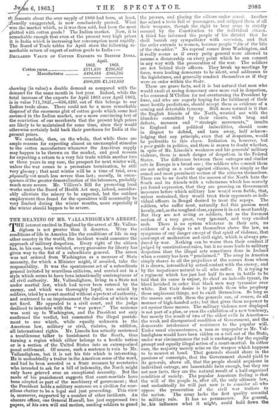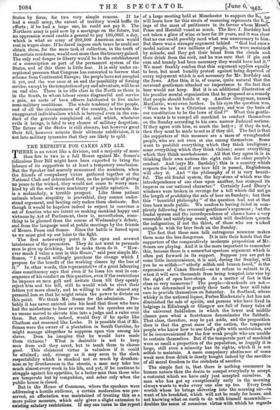THE MEANING OF MR. VA LL ANDIGHAWS ARREST.
THE interest excited in England by the arrest of Mr. Vallan- digham is not greater than it deserves. Were the conditions of life in America like the conditions of life in any -other country in the world, the incident would announce the -approach of military despotism. Every right of the citizen -has, in his case, been violated, every guarantee for liberty has _given way to the fiat of a subordinate general. The arrest was not ordered from Washington as a measure of State .necessity, for which a Minister might, if assailed, take the responsibility. It was the spontaneous act of a subordinate general irritated by scurrilous criticism, and carried out in a style which seems to have been intentionally contemptuous of -all civil authority. Mr. Vallandigham, living in a State not - under martial law, which had never been entered by the enemy, and, which was thoroughly loyal, was seized by -soldiers, tried by a court-martial without a pretext of authority, -and sentenced to an imprisonment the duration of which was not fixed. He appealed to a civil court, and the judge declined to interfere with the "war power." The sentence was sent up to Washington, and the President not only • -confirmed the verdict, but commuted the illegal punish- ment to one which, while equally unknown to the . American law, military or civil, violates, in addition, all international rights. Mr. Lincoln has actually sentenced a troublesome talker to banishment to the South, thus turning a region which either belongs to a hostile nation .or is a section of the United States into an extemporized e n al settlement. Of course, such a sentence is ruin to Mr. Vallandigham, but it is not his fate which is interesting. He is undoubtedly a traitor in the American sense of the word, and had he been arrested as a State measure by secretaries who intended to ask for a bill of indemnity, the North might only have grieved over an exceptional necessity. But the mode of his punishment suggests that court-martials have been adopted as part of the machinery of government ; that the President holds a military sentence on a civilian for scur- rilous chatter to be a legal and just proceeding. This view is, moreover, supported by a number of other incidents. An obscure officer, one General Hascall, has just suppressed two papers, of his own will and motion, sending soldiers to guard the presses, and placing the editors under arrest. Another has seized a train full of passengers, and stripped them of all their weapons, though the right to bear arms is strictly secured by the Constitution to the individual citizen. A. third has informed the people of his district that he shall banish any sympathizer with secession, and that the order extends to women, because people "die of the bite of the she-adder." No reproof comes from Washington, and it really seems as if every petty general were allowed to assume a dictatorship on every point which he can connect in any way with the prosecution of the war. The soldiers are not behind their officers. They break up meetings by force, warn leading democrats to be silent, send addresses to the legislatures, and generally conduct themselves as if they were an order within the State.
These are grave facts, and it is but natural that men who would exult at seeing democracy once more end in despotism, who censured M'Clellan for not overturning the President by force, and who are eagerly hoping for the fulfilment of their most hostile predictions, should accept them as evidence of a coming and detestable tyranny. Still more natural is it that the English friends of the North, wearied out with the blunders committed by their clients, with brag and. defeats, menaces and " strategic movements," insults to England and political imbecilities, should cease in disgust to defend, and turn away, half acknow- ledging that any principle, even that of despotism, would be preferable to this chaos. Irritation is, however, but a poor guide in politics, and there is reason to doubt whether, in spite of Mr. Lincoln's weakness and his generals' military violence, there is much danger of despotism in the Federal States. The difference between these outrages and similar acts in Europe is a broad one ; the soldiers who commit them are not acting as a caste against citizens, but simply as the armed and most prominent section of the citizens themselves. There can be no doubt that the masses of the North hate the South and its friends with a vehemence which has scarcely yet found expression, that they are pressing on Government measures before which military law would seem feeble, that, unless restrained, they would treat their opponents as indi- vidual officers in Bengal desired to treat the sepoys. The soldiers, who suffer most, naturally feel this passion most keenly, and, as the roughest class, express it in act most harshly. But they are not acting as soldiers, but as the foremost section of a very great, very ignorant, and very excited mob. There is no system whatever in their acts, no evidence of a design to set themselves above the law, no symptoms of any danger except of that spirit of violence, that contempt of moderation and civil right, which is always pro- duced by war. Nothing can be worse than their conduct if judged by constitutional rules, but it no more leads to military despotism than the illegal acts sometimes done in Ireland when a county has been "proclaimed." The army in America simply shares in all the prejudices of the masses from whom it is drawn, intensified by actual contact with the enemy, and by the impatience natural to all who suffer. It is trying to a regiment which has just lost half its men in battle to be told that its cause is unjust, its chief an imbecile tyrant, its blood lavished in order that black men may tyrannize over white. But their desire is to punish those who prophesy these unpleasant things, not to exalt themselves. So long as the masses are with them the generals can, of course, do all manner of high-handed acts; but that gives them no power to act against those masses. The military violence now displayed is not part of a plan, or even the exhibition of a new tendency, but merely the result of two of the oldest evils in America— the weak and disorganized condition of Government, and the democratic intolerance of resistance to the popular will. Under usual circumstances, a man as unpopular as Mr. Val- landigham would have been 'laden on a rail out of the State, under war circumstances the rail is exchanged for the equally prompt and equally illegal action of a court-martial. In either case, the majority merely seize on the weapon which happens to be nearest at hand. That generals should share in the passions of conscripts, that the Government should yield to its generals, above all, that the people should acquiesce in individual outrage, are lamentable facts enough, but they are not new facts, they are the natural result of a half-organized condition of society. The popular American feeling is that the will of the people is, after all, the only ultimate law, and undoubtedly its will just now is to consider. all who oppose the prosecution of the civil war traitors to the nation. The army lacks the first quality essential to military rule. It has no permanence. No general, be , his influence what it might, could hold down the States by force, for two very simple reasons. If he had a small army, the extent of territory would baffle its efforts ; if he had a large one, he could not pay it. The Northern army is paid now by a mortgage on the future, but no oppression would enable a general to pay 100,000/. a day, which is what an army of 200,000 American men would cost in wages alone. If he dared impose such taxes he could not obtain them, for the mere task of collection, in the teeth of the certain resistance, would cost more than the treasury gained. The only real danger to liberty would be in the establishment of a conscription as part of the permanent system of the States, and of this there is little fear. It is only under ex- ceptional pressure that Congress has consented to borrow that scheme from Continental Europe; the people have not accepted it yet, and the war once at an end the possibility of forcing service, except by the temptation of pay and adventure, will be at an end also. There is no idle class in the North as there is in the South, to whom labour seems disgraceful and service a gain, no caste of born officers habituated to live under semi-military conditions. The whole tendency of the people, and of all the circumstances of the country, is towards the exaggerated individualism which is betrayed even in the con- duct of the generals complained of, and which, whatever evils it brings, is fatal to any chance of military despotism. The future of the States is still obscure, but however great their fall, however minute their ultimate subdivision, it is not into military tyrannies that they are likely to split.































 Previous page
Previous page